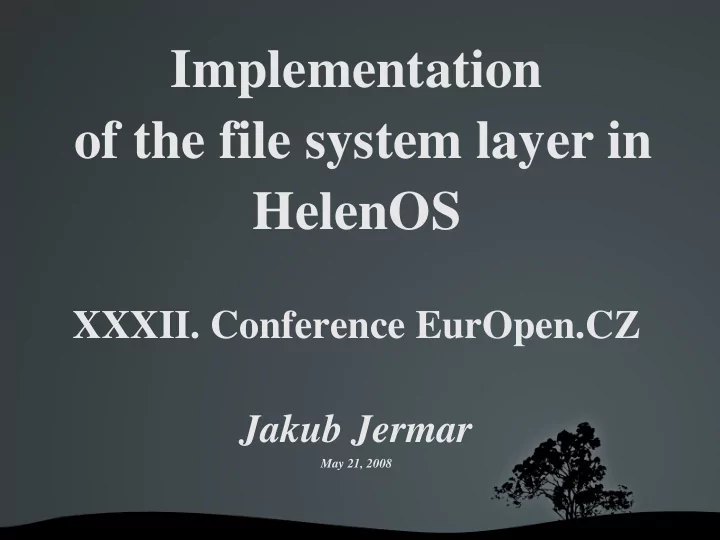

Implementation of the file system layer in HelenOS XXXII. Conference EurOpen.CZ Jakub Jermar May 21, 2008
HelenOS basic facts http://www.helenos.eu Experimental general purpose operating system Microkernel and userspace libraries and services Incomplete, under development Lack of file system support Major barrier preventing adoption
Project history 9 8 7 6 5 Developers Architectures Theses in Progress 4 Finished Theses 3 2 1 0 2001 2002 2003 2004 2005 2006 2007 2008
File systems vs. Monolithic kernels Well understood topic Several well-known implementations Everything runs in one address space VFS polymorphism via structures with function pointers Function calls Execution in kernel
Big picture: monolithic kernels Standard library Kernel VFS DRIVERS TMPFS RAMDISK FAT IDE Client application Client application Client application
File systems vs. Microkernels Well understood topic? Problems: What does the big picture (should) look like No common address space Breaking functionality into separate entities Execution in userspace How do the separate entities communicate? IPC messages Memory sharing Data copying
Big picture: HelenOS Standard library TMPFS VFS libfs library FAT Client application RAMDISK DEVMAP IDE Client application Client application
Standard library Applications use a ”subset” Standard of POSIX calls library The library translates some of these calls to VFS calls Directly Wraps around others Client application Relative to absolute paths Client application Client application
VFS frontend VFS nodes Open files per client Path canonization Standard library Reference counting Synchronization VFS Multiplexes requests
VFS backend Registry of individual FS Pathname Lookup Buffer VFS shares PLB read-write FS share PLB read-only TMPFS VFS VFS output protocol FAT All output VFS methods All FS must understand it VFS polymorphism
Individual FS servers Implement the output VFS protocol File system's logic Cache some data/metadata TMPFS VFS in memory FAT Understand VFS triplets (fs_handle, dev_handle, index)
libfs library FS registration code libfs_lookup Template for TMPFS VFS_LOOKUP libfs library libfs_ops_t FAT Virtual methods needed by libfs_lookup
Block device drivers All block devices required to implement the same protocol FAT FS doesn't care what block device it is mounted on RAMDISK FS learns about the device and its driver via DEVMAP
DEVMAP Registry of block device drivers and block device instances FAT Maps device handles to connections RAMDISK DEVMAP IDE
File system synchronization Mostly in VFS VFS nodes have contents RW lock Namespace RW lock No locking for table of open files Per-fibril data a.k.a. TLS Less synchronization in individual FS servers
Means of communication Short IPC messages (method + up to 5 arguments) Both requests and answers Memory sharing and data copying integrated in IPC Parties negotiate over IPC; kernel carries out the action Combo messages Short and combo messages can be forwarded Memory shared/data copied only between the endpoints Sender masquerading
Communication example: open() 2. VFS_OPEN 4. VFS_LOOKUP Standard library TMPFS VFS libfs library PLB 3. IPC_M_DATA_WRITE ... /myfile ... 1. open(”/myfile”, ...) Client application 5. libfs_lookup()
VFS + Standard library Fairly complete, but still evolving mount(), open(), read(), write(), lseek(), close(), mkdir(), unlink(), rename() opendir(), readdir(), rewinddir(), closedir() getcwd(), chdir() Missing stat(), unmount(), ... mmap()
TMPFS Both metadata and data live in virtual memory No on-disk format No block-device needed Contents lost on reset Implementation complete Testing purposes
FAT FAT16 Work in progress Not that easy as it might seem Simple on-disk layout Non-existence of stable and unique node indices Evolution of translation layer that provides stable unique indices
Perspective Finishing FAT Needed for loading programs from disk Needed for non-root mounts Evolving block device drivers Block cache More FS implementations Improving IPC mechanism for copying data Swapping to/from file system
http://www.helenos.eu Jakub Jermar
Recommend
More recommend